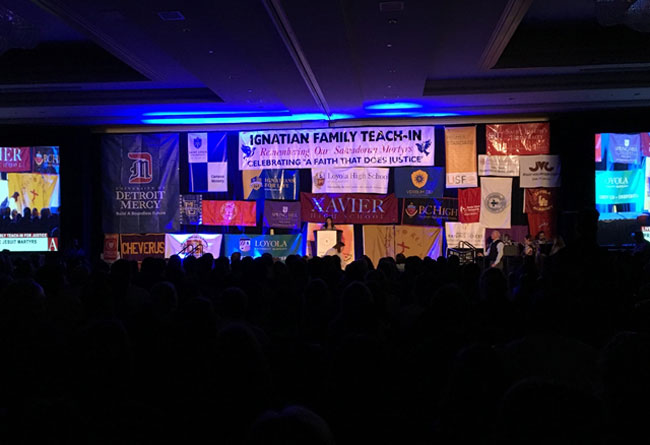
Ignatian Family Teach-in for Justice, Washington, D.C., 2016.
President-Elect Donald J. Trump is following his iconoclastic campaign with an irregular and irreverent transition period. With a controversial nominee for Secretary of State (an oil executive decorated with an award by the Russian government), a renewed commitment to track Muslims, and tweets about “nukes,” the shaping of the future of U.S. foreign policy has been notable.
A distinction might be made, though, between the hard power of U.S. foreign policy and the soft power constructed daily from unofficial American foreign policy. Presidents make speeches, host summits, sign executive orders, and send troops into battle. But thousands of ordinary Americans serve as unofficial ambassadors of the United States—many counter, or oblivious to official policy.
Americans made over 73 million international trips in 2015. These included 12 million to Mexico, 12 million to Europe, 5 million to Asia, 2 million the Middle East, and more than 300,000 to Africa. Over 300,000 thousand American university students study abroad each year, including more than 10,000 in Africa, 30,000 in Asia, and nearly 50,000 in Latin America. More than 100,000 Americans serve overseas as Christian missionaries. Thousands more serve abroad in non-evangelical roles with organizations like the Jesuit Volunteer Corps. (And there are 7,000 active Peace Corps volunteers, a U.S. government agency but whose work in 60 countries far from the daily business of the State Department.)
Unofficial foreign policy is made with money, as well. U.S. companies held over $5 trillion in overseas direct foreign investment in 2015, including over $400 million in Ukraine, $90 billion in Mexico, and $2 billion in Libya. U.S. companies generated exports of $2.2 trillion in goods and services in 2015, and imports of $2.7 trillion. Migrant workers in the U.S. sent home over $60 billion in remittances in 2015. The U.S. Government’s foreign assistance budget is $34 billion, but American individuals and private organizations donated another $16 billion.
Together, American companies and individuals intentionally or unintentionally drive a tremendous amount of public diplomacy and the foreign policy agenda. Among the many competing interests, the message of one group of young people has stayed consistent for many years. Students and their Jesuit universities remain passionately committed to social justice, and the United States government’s unique obligations.
Their 18th annual conference met recently in Washington. Begun as a protest movement at the U.S. military’s School of the Americas (SOA), a Cold War-era training facility for Latin American anti-Communists, the 2016 Ignatian Family Teach-in for Justice brought together over 1,800 high school and college students on a range of social justice topics, especially immigration.
The origins of this emphasis are rooted in the civil wars in Central America in the 1980s, especially El Salvador. U.S. foreign policy at the time was driven by a worsening of the Cold War, supporting anti-government Contras against the Soviet-supported Nicaragua, and the military government of El Salvador against Soviet-supported guerrilla groups.
Salvadoran Archbishop Oscar Romero was assassinated while celebrating Mass, after persistently advocating a “preference for the poor,” and just one day after he called for Salvadoran soldiers to stop killing their fellow countrymen. At Romero’s funeral, dozens more were killed by gunshots and the subsequent stampede.
In 1989, six Jesuits priests at the University of Central America in San Salvador were killed by the government death squads. As one observer noted, “It is frankly difficult to imagine anything more likely to spur American Jesuits to action than the complicity of their own government in the violent death of their fellow Jesuits.” The presidents of Georgetown University and Fordham University led the charge, and Jesuit universities across the country strengthened their commitment to peace in Central America generally and to the cause of Central American immigration specifically.
Immigration reform has new urgency as the Trump administration takes shape. The 2016 Ignatian Family Teach-in for Justice took place just days after Trump’s victory. Students and their social justice mentors shared a shock and dismay at what the results might mean, especially those young beneficiaries of President Obama’s Deferred Action for Childhood Arrivals (DACA) program, or those with parents and friends without legal status in the United States.
The focus of these conferences leaves some questions. They seem to give more attention to undocumented aliens in the U.S. than to those trying to follow the system’s legal paths, and a precedence for Mexican and Central American immigrants over refugees from Syria, Iraq, Africa, or elsewhere.
But their commitment is not in doubt. Jesuit schools have been working with generations of students on these and related issues, like fair trade, the environment, and criminal justice reform. And not just for discernment—for action. After celebration and education on Saturday and Sunday, on Monday more than 1,000 students had appointments with Congressional staffs to express their political passions—and to begin to develop their political advocacy skills.
The new President and Secretary of State will have a wide range of foreign policy issues to attend to, including immigration, trade, the environment, conflict, global poverty, and more. The professional diplomatic corps, lobbyists, and policy wonks will make their contributions. But millions of unofficial ambassadors—as students and scholars, business professionals, service volunteers, donors, and tourists—will help shape the image and expectations of America abroad, and the policies of the new administration.